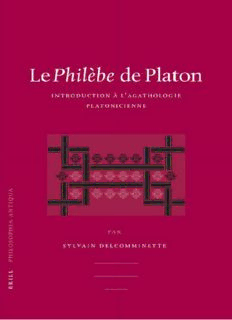
Le Philèbe de Platon: Introduction à l’Agathologie Platonicienne (Philosophia Antiqua) PDF
Preview Le Philèbe de Platon: Introduction à l’Agathologie Platonicienne (Philosophia Antiqua)
LE PHILÈBE DE PLATON PHILOSOPHIA ANTIQUA A SERIES OF STUDIES ON ANCIENT PHILOSOPHY PREVIOUS EDITORS † † J.H. WASZINK , W.J. VERDENIUS , J.C.M. VAN WINDEN EDITED BY K.A. ALGRA, F.A.J. DE HAAS J. MANSFELD, D.T. RUNIA VOLUME C S. DELCOMMINETTE LE PHILÈBEDE PLATON LE PHILÈBE DE PLATON introduction à l agathologie platonicienne ’ PAR S. DELCOMMINETTE BRILL LEIDEN •BOSTON 2006 Publié avec le concours de la Fondation Universitaire de Belgique This book is printed on acid-free paper. Library of Congress Cataloging-in-Publication Data Delcomminette, Sylvain. Le Philèbede Platon : introduction à l’agathologie platonicienne / par S. Delcomminette. p. cm. — (Philosophia antiqua, ISSN 0079-1687 ; v. 100) Includes bibliographical references and index. ISBN90-04-15026-9 (hard : alk. paper) 1. Plato. 2. Pleasure. 3. Plate. Philebus. I. Title. II. Series. B398.P56D45 2006 1 1’.4—dc27 2006042538 ISSN 0079-1687 ISBN 90 04 15026 9 © Copyright 2006 by Koninklijke Brill NV, Leiden, The Netherlands Koninklijke Brill NV incorporates the imprints Brill Academic Publishers, Martinus Nijhoff Publishers and VSP. All rights reserved. No part of this publication may be reproduced, translated, stored in a retrieval system, or transmitted in any form or by any means, electronic, mechanical, photocopying, recording or otherwise, without prior written permission from the publisher. Authorization to photocopy items for internal or personal use is granted by Brill provided that the appropriate fees are paid directly to The Copyright Clearance Center, 222 Rosewood Drive, Suite 910 Danvers MA 01923, USA. Fees are subject to change. printed in the netherlands «Être conséquent est l’obligation principale d’un philosophe, et c’est ce que l’on ren- contrelemoinssouvent.» —Kant Socrate:«Envérité,trèscher,moidumoins, jepensequ’ilvautmieuxquelalyresoitdis- cordanteetdissonante,oumêmeunchœur que je devrais diriger, ou que la plupart des hommesne soientpasd’accord avecmoiet mecontredisent,plutôtque,moiquisuisun, de ne pas être d’accord avec moi-même et demecontredire.» —Platon TABLE DES MATIÈRES Remerciements..................................................... xiii Avertissement....................................................... xv Introduction........................................................ 1 Première Partie ÉLABORATION DU PROBLÈME ChapitreI:Miseenplace ......................................... 23 §1. Lespositionspréliminaires............................... 23 §2. Laprédicationdubien.................................... 28 §3. Préparatifspourladiscussion............................ 33 §4. Lestroisproblèmes........................................ 39 ChapitreII:L’unetlemultiple .................................. 51 §1. Lesproblèmesdel’unetdumultiple................... 51 a. Lesproblèmespuérils................................. 51 b. Lesproblèmessérieux ................................ 55 1. Letexte ............................................. 55 2. Lesproblèmes...................................... 59 3. Oùsetrouvelasolutiondecesproblèmes?.... 74 c. Organisationdialectiquedesproblèmesdel’un etdumultiple .......................................... 77 §2. Sophistiqueetdialectique ................................ 78 a. L’originelinguistiquedel’identificationentre l’unetlemultiple...................................... 78 b. Lasophistique.......................................... 83 c. Ladialectique .......................................... 91 1. Descriptionexterne ............................... 91 viii tabledesmatières 2. Descriptioninterne................................ 96 a. Lepointdedépart ............................ 96 b. Lerassemblement.............................101 c. Ladivision......................................110 d. L’abandondesespècesdansl’apeiron.......125 3. Lesexemples.......................................130 ChapitreIII:Premièreapprochedubien ......................161 §1. LesplaintesdeProtarque.................................161 §2. Unenouvellevoiepourunnouveauproblème........164 §3. Lescritèresdubien........................................165 §4. Laméthode.................................................169 §5. Laviedeplaisir ............................................172 §6. Lavied’intelligence.......................................183 §7. Laviemixte.................................................186 §8. Lacause.....................................................194 §9. Lesgainsdialectiquesdecettesectiondudialogue...198 ChapitreIV:Mélanges ............................................201 §1. Delaméthodedivineàladivisionquadripartite ......201 §2. Ladivisionquadripartite..................................212 a. Lecadredeladivision ................................212 b. τ(cid:3)(cid:4)πειρ(cid:9)ν...............................................216 c. τ(cid:3)π(cid:11)ρας .................................................230 d. τ(cid:3)μεικτ(cid:15)ν................................................242 e. (cid:16)α(cid:17)τ(cid:18)α....................................................248 §3. Applicationdeladivisionquadripartiteauproblème delaviemixte..............................................258 §4. Deladivisionquadripartiteàlaméthodedivine ......276 tabledesmatières ix Deuxième Partie LES DIVISIONS première section: les plaisirs ChapitreV:L’analyseduplaisirdansl’économiedu dialogue ..........................................................289 ChapitreVI:Lecadregénéraldel’analyse.....................297 §1. Pointdevueexterne ......................................297 a. Premièreespèce .......................................297 b. Deuxièmeespèce......................................303 c. Lapossibilitéd’unétatneutre .......................310 §2. Pointdevueinterne.......................................313 a. Versunereconstructiondelagenèselogiquedes pouvoirsdel’âme......................................313 b. Lasensation ............................................315 c. Lamémoire ............................................321 d. Laréminiscence .......................................324 e. Ledésir..................................................330 f. Laviedanslesmélanges..............................345 ChapitreVII:Lesplaisirsfaux....................................349 §1. Leproblèmedelavéritéetdelafaussetéduplaisir ..349 §2. Lesespècesdeplaisirsfaux...............................362 a. Premièreespèce .......................................362 1. Lerôledeladoxa danslaperception...........362 2. L’imagination ......................................375 3. Applicationaucasdesplaisirs ...................383 4. Lateneuragathologiquedelavérité............391 b. Deuxièmeespèce......................................399 c. Troisièmeespèce.......................................412
Description: